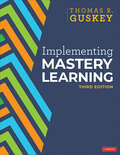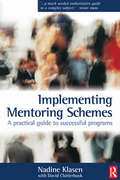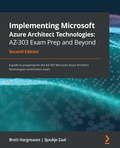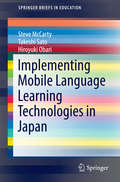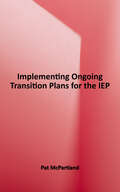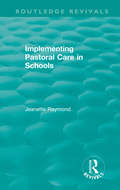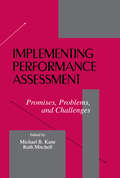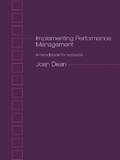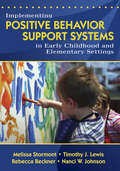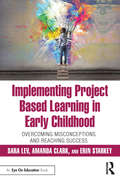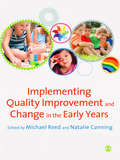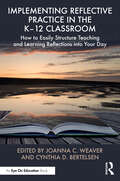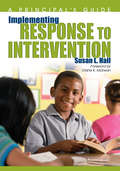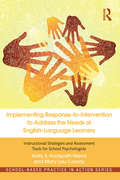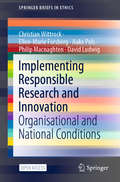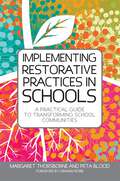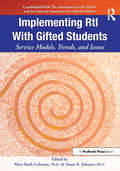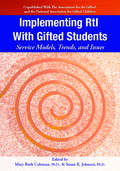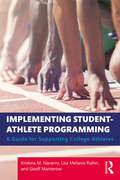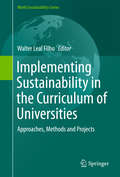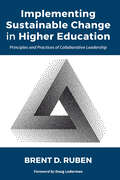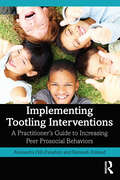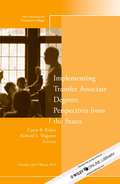- Table View
- List View
Implementing Mastery Learning
by Thomas R. GuskeyThe definitive classic—updated for our times. After 50 years, Benjamin Bloom’s revolutionary work on mastery learning is more relevant than ever. One of the most widely researched and proven-effective education methodologies in existence, it provides a direct challenge to the traditional, deterministic, time-based approaches to teaching and learning that have perpetuated inequities for generations of children. Mastery learning is the progenitor of many of today’s most promising teaching methods, including competency-based learning, personalized instruction, and differentiated instruction. It helped to elevate the importance and use of formative assessment as a powerful instructional practice. This timely new edition of the foremost practical guide includes: Recent applications of the principles of mastery learning to distance, hybrid, and blended learning environments Updates including evidence from recent implementation efforts, the results of the most current research on mastery learning and its implications for practice Step-by-step guidance on implementation across grade levels and subject areas Supplemental, on-line chapters that unpack the development of effective formative assessments and connections between RTI and mastery learning Written by one of the most highly regarded scholar/practitioners in the field and the leading interpreter of Bloom’s work, this updated guidebook is essential reading for teachers, school leaders, professional learning communities, and anyone who believes that all students can learn well, achieve success, and become confident learners.
Implementing Mentoring Schemes
by David Clutterbuck Nadine KlasenOver the past few years the application of mentoring in business has risen steeply and more organizations than ever are seeking to utilize its power. 'Implementing Mentoring Schemes' constitutes the most comprehensive and up-to-date coverage of the design, implementation, evaluation and revitalization of mentoring schemes. Although it can be used as a practical "how-to" guide on implementing mentoring schemes, it is ultimately a book that promotes best practice, combining academic research and case studies with many years of practical experience to produce expert advice. It enables readers to fully understand mentoring and to create state-of-the-art programs. In addition, it establishes a tenable case for mentoring that will greatly assist readers in promoting programs within their organization.
Implementing Microsoft Azure Architect Technologies: AZ-303 Exam Prep and Beyond
by Brett HargreavesThis book is for solution architects and experienced developers who advise stakeholders and translate business requirements into secure, scalable, and reliable solutions. Technical architects interested in learning more about designing cloud solutions will also find this book useful. Prior experience and knowledge of various aspects of IT operations, including networking, security, business continuity, disaster recovery, budgeting, and governance, will assist with understanding the concepts covered in the book.
Implementing Mobile Language Learning Technologies in Japan
by Steve Mccarty Hiroyuki Obari Takeshi SatoThis book explores theoretical and practical aspects of implementing mobile language learning in university classrooms for English as a Foreign Language in Japan. The technologies utilized, such as smartphones, iPads, and wi-fi, integrate students' hand-held devices into the campus network infrastructure. The pedagogical aims of ubiquitous mobile learning further incorporate social media, blended learning, and flipped classroom approaches into the curriculum. Chapter 1 defines mobile language learning within dimensions of e-learning and technology-assisted language learning, prior to tracing the development of mobile learning in Japan. Chapter 2 documents the sociocultural theory underpinning the authors' humanistic approach to implementation of mobile technologies. The sociocultural pedagogy represents a global consensus of leading educators that also recognizes the agency of Asian learners and brings out their capability for autonomous learning. Case studies of universities, large and small, public and private, are organized similarly in Chapters 3 to 5. Institutional/pedagogical and technological context sections are followed by detailed content on the implementation of initiatives, assessment of effectiveness, and recommendations for other institutions. Distinct from a collection of papers, this monograph tells a story in brief book length about theorizing and realizing mobile language learning, describing pioneering and original initiatives of importance to practitioners in other educational contexts.
Implementing Ongoing Transitions Plans for the IEP
by Pat McPartlandThis text uses a student-driven approach to fulfill IDEA mandates. It presents a concise yet comprehensive program for graduation-track special education students. It focuses on the seven areas mandated by IDEA: Functional assessment, daily living skills, post-school adult living, employment, community experiences, related services and instructions. Each area has a sequence of skills and behaviors written as objectives that teachers, parents and students review for inclusion in the IEP. A ready-to-go, yet easy-to-personalize pre-IEP assessment starts the process. A gem of a book for any secondary special education teacher or administrator.
Implementing Pastoral Care in Schools (Routledge Revivals)
by Jeanette RaymondAll schoolteachers are involved in pastoral care, either in their roles as form teachers or year tutors or more generally in their everyday contact with children. Pastoral care is a wide ranging area which involves amongst other things the building in children of social skills and a positive self-image in order to help them be well-motivated contributors to school life and to wider society. It also involves helping children cope with the stress of everyday school life, including examinations; familiarising them with school organisation; and helping children who have specific behaviour problems or personal crises. The book, originally published in 1985, surveys the whole field of pastoral care in schools at the time. It discusses the aims, methods and implementation of a successful pastoral care system. It reviews relevant theories and research work but throughout the emphasis is on practical matters, on helping teachers work out intelligently for themselves how they might improve their performance in this field.
Implementing Performance Assessment: Promises, Problems, and Challenges
by Ruth Mitchell Michael B. KaneAs the commitment to performance assessments as a strategy of reform has increased across the nation, so has the controversy surrounding the purposes, development, implementation, and effects of alternative forms of assessment. One of the first of its kind, this edited volume provides an incisive and comprehensive account of the issues pertaining to performance assessments. The 10 papers comprising the volume were originally written to establish a conceptual framework for a three-year U.S. Department of Education, Office of Educational Research and Improvement sponsored national study of performance assessments. Written by leading experts in the field, the papers explicate the central issues regarding the development, implementation, and utility of performance assessments. The topics covered by the papers include: * a discussion of contemporary as well as historical events in the performance assessment movement; * technical characteristics of performance assessments, including reliability, validity, generalizability, and calibration; * conceptualization and calculation of the costs of performance assessments; * the implications of performance assessments on students who have traditionally done less well in American schools, including racial and linguistic minorities; * the fit between performance assessments and organizational change in education; and * the utilization of performance assessment as an instrument of state policy. Readers will find the policy and technical issues covered in this volume to be useful from a variety of academic, research, and policy perspectives including conceptualizing and implementing performance assessments.
Implementing Performance Management: A Handbook for Schools
by Joan DeanThis book is for headteachers, senior and middle managers in both primary and secondary schools, and all teachers involved in the performance management process. It sets out the aims and objectives of the system, and offers sensible, practical advice to help make performance management work effectively in schools. Case studies are used to illustrate the processes involved in performance management, and each chapter ends with suggestions for staff discussions, looking at the common concerns and issues that arise. Joan Dean has taught in primary, secondary and further education, and has held two headships. She has also been a primary schools adviser and a chief inspector, and has published more than thirty books on education. In 1980, she was awarded the OBE for services to education.
Implementing Positive Behavior Support Systems in Early Childhood and Elementary Settings
by Melissa A. Stormont Timothy J. Lewis Rebecca Sue Beckner Dr Nanci JohnsonDiscover how to implement the Programwide/Schoolwide Positive Behavioral Support (PW/SW-PBS) system, a prevention-based approach for teaching and supporting appropriate behavior in preschool and elementary school children.
Implementing Project Based Learning in Early Childhood: Overcoming Misconceptions and Reaching Success
by Amanda Clark Sara Lev Erin StarkeyThis ground-breaking book proves that Project Based Learning (PBL) does work in early childhood classrooms. Most common understandings of PBL in Pre-K through 2nd grade are rife with assumptions, misconceptions, and perceived barriers that have prevented its widespread implementation. Implementing Project Based Learning in Early Childhood breaks down these barriers, offering teachers and leaders at various stages of PBL implementation the tools, resources, instructional strategies, and suggestions needed to dispel the myths and discover the truth. Full of practical approaches and strategies, chapters encourage you to consider your current practices from new perspectives while "Reflect and Connect" sections provide opportunities to think through your questions, make connections to your current practices, and plan your next steps. Educators will gain a deep understanding of PBL in early childhood and build their confidence to engage all students in high quality Project Based Learning from the beginning of the school year to the end.
Implementing Quality Improvement & Change in the Early Years
by Michael Reed Ms Natalie CanningFor all those working in Early Years, improving quality experiences for all young children is a priority. By examining issues surrounding quality improvement, the importance of reflective practice and the attributes required in the workplace to effect change and leadership, this book provides a contemporary view of practice. Chapters focus on how settings can improve quality experiences for young children and how to implement strategies that lead to quality improvement. Issues covered include: - multi-disciplinary working - evaluating impact through reflective practice - creativity, digital technologies and play - safeguarding young children - leading practice and leading change - working with parents - improving the quality of student experience This text allows students and practitioners to examine and reflect on practises that lead to creative Quality Improvement Strategies (QIS) in Early Years settings. Michael Reed is a Senior Lecturer at the University of Worcester, Institute of Education: Centre for Early Childhood Natalie Canning is a Lecturer in Early Years at The Open University.
Implementing Reflective Practice in the K–12 Classroom: How to Easily Structure Teaching and Learning Reflections into Your Day
by Cynthia D. Bertelsen Joanna C. WeaverThis resource offers teachers a simple framework to seamlessly add reflective practice to their day and encourages educators to critically reflect on instructional planning and practice. Commonly used in other busy professions, the SOAP Notes structure makes it easy to reflect on student progress through any lesson or learning activity, regardless of grade band or content area. Each category—Subjective, Observation, Assessment, and Planning—allows for documentation of obstacles, difficulties, or challenges within a lesson so educators can address these concerns in subsequent lessons. Each chapter features an in-service teacher who used SOAP Notes reflections in their classrooms to improve their instruction and student learning. Contributors are from diverse teaching backgrounds, schools, and student populations. The authors include instructions for using the template in a variety of scenarios, blank worksheets, completed SOAP examples, and important take-aways. Whether there is an hour or only minutes in the day to focus on reflective practice, these teachers demonstrate how this framework makes this activity possible in any classroom. Ideal for preservice and in-service teachers, administrators, and other education professionals across K–12 settings, this accessible read demonstrates the ease of reflective practice while celebrating teacher voices. This simple structure makes adding reflection and intention to teachers’ routine immediately doable.
Implementing Response to Intervention: A Principal's Guide
by Susan L. HallLearn how to launch RTI successfully and improve student outcomes significantly! This principal's guide to implementing Response to Intervention (RTI) for elementary and middle school reading emphasizes the critical role administrators play in ensuring RTI success in their schools. The author makes recommendations for putting the RTI process in motion and helps school leaders: <p><p> Formulate a comprehensive assessment plan that includes an assessment calendar and a data management system <p> Design a yearlong staff development plan to train teachers in using data for making instructional decisions <p> Use data in grade-level, teacher, and parent meetings <p> Motivate staff for optimum success without overwhelming them
Implementing Response-to-Intervention to Address the Needs of English-Language Learners: Instructional Strategies and Assessment Tools for School Psychologists (School-Based Practice in Action)
by Holly S. Hudspath-Niemi Mary Lou ConroyThere is considerable concern surrounding the complex issue of how to meet the learning needs of English-language learners within general and special education programs. Implementing Response-to-Intervention to Address the Needs of English-Language Learners increases school psychologists’ knowledge of intervention strategies related to ELLs, through its examination of the challenges associated with evaluating ELLs and by providing a collaborative framework to enhance educational identification and placement in special education. It accomplishes this by incorporating research-based intervention approaches for ELLs and offering a comprehensive guide to the processes and tools that school teams should consider when utilizing a response to intervention model to support the academic and behavioral needs of ELLs. With a strong focus on alternative assessment, collaboration, and parental involvement, this volume in a definitive touchstone in the quest to provide culturally responsive pedagogy and appropriate adapted classroom instruction for English-language learners of various proficiency levels.
Implementing Responsible Research and Innovation: Organisational and National Conditions (SpringerBriefs in Ethics)
by David Ludwig Ellen-Marie Forsberg Christian Wittrock Auke Pols Philip MacnaghtenThis open access book offers a unique and practically oriented study of organisational and national conditions for implementing Responsible Research Innovation (RRI) policies and practices. It gives the reader a thorough understanding of the different aspects of RRI, and of barriers and drivers of implementation of RRI related policies. It shows how different organisational and national contexts provide unique challenges and opportunities for bringing RRI into practice. The book provides concrete examples and offers the reader both a theory-based understanding of the topic, as well as guidance for action. The target audience encompasses, in addition to RRI students and scholars in particular, all students and scholars in the field of Science and Technology Studies (STS). The book is also of interest to students and scholars in the fields of research ethics, philosophy of science, organisational governance in the research system and organisational theory more generally. Finally, the book is of use to practitioners in research conducting and funding organisations working to implement RRI.
Implementing Restorative Practice in Schools: A Practical Guide to Transforming School Communities
by Graham Robb Margaret Thorsborne Peta BloodRestorative practice is a proven approach to discipline in schools that favours relationships over retribution, and has been shown to improve behaviour and enhance teaching and learning outcomes. However, in order for it to work, restorative practice needs a relational school culture. Implementing Restorative Practice in Schools explains what has to happen in a school in order for it to become truly restorative. Section 1 explains the potential of restorative practice in schools, describing the positive outcomes for students and teachers. It also outlines the measures that need to be in place in order to embed restorative practice. Section 2 examines the process of understanding and managing change, providing realistic and pragmatic guidance on the practical and emotional barriers that may be encountered. Finally, Section 3 provides in eight practical steps, strategic guidance for achieving a restorative culture that sticks. Featuring useful pro formas and templates, this book will be an indispensable guide for educators, administrators and school leaders in mainstream and specialist settings.
Implementing RtI With Gifted Students: Service Models, Trends, and Issues
by Mary Ruth Coleman Susan K. JohnsenImplementing RtI With Gifted Students shares how RtI can fit within the framework of gifted education programming models. This edited book will serve as a reference guide for those interested in learning more about RtI and how it might be effectively implemented to meet the needs of all gifted students. Chapters contributed by top gifted education experts focus on topics including tiered supports and services for gifted learners; screening, assessment, and progress monitoring; evidence-based practices; popular gifted education models that fit within a tiered framework; and diversity. Additional resources for schools include a self-assessment needs survey; guidelines for planning; forms, templates, and timelines for getting started; and rubrics for reviewing implementation fidelity and progress.
Implementing RtI with Gifted Students: Service Models, Trends, and Issues
by Mary Ruth Coleman Susan JohnsenImplementing RtI With Gifted Students shares how RtI can fit within the framework of gifted education programming models. This edited book will serve as a reference guide for those interested in learning more about RtI and how it might be effectively implemented to meet the needs of all gifted students. Chapters contributed by top gifted education experts focus on topics including tiered supports and services for gifted learners; screening, assessment, and progress monitoring; evidence-based practices; popular gifted education models that fit within a tiered framework; and diversity. Additional resources for schools include a self-assessment needs survey; guidelines for planning; forms, templates, and timelines for getting started; and rubrics for reviewing implementation fidelity and progress.
Implementing Student-Athlete Programming: A Guide for Supporting College Athletes
by Kristina M. Navarro Lisa Melanie Rubin Geoff MamerowIn Implementing Student-Athlete Programming, scholar-practitioners provide an approachable and comprehensive overview of how to design, implement, and sustain best practices in the growing area of student-athlete development. Exploring research approaches and critical frames for thinking about student-athlete programming while covering topics such as the current context, challenges, programmatic approaches to support, and trends for the future, this resource also highlights programs that are effective in supporting students to success. This book provides higher education practitioners with the tools they need to effectively work with student-athletes to not only transition to college, but to develop meaningful personal, social, career, and leadership development experiences as they prepare for the transition to life after sport.
Implementing Sustainability in the Curriculum of Universities: Approaches, Methods And Projects (World Sustainability Series)
by Walter Leal FilhoThis book presents sustainable development themes across universities and introduces methodological approaches and projects to the teaching staff. It has been prepared against this background, to identify ways to better teach about sustainability issues in a university context. It contains a set of papers presented at a Symposium with the same title, held at Manchester Metropolitan University (UK) in March 2017. The event was attended by a number of institutions of higher education active in this field. It involved researchers in the field of sustainable development in the widest sense, from business and economics, to arts and fashion, administration, environment, languages and media studies. Sustainability is seldom systematically embedded in the curriculum at higher education institutions. Yet, proper provisions for curricular integration of sustainability issues as part of teaching programmes across universities are an important element towards curriculum greening. The aims of this book are: (i) to provide teaching staff at universities active and/or interested in teaching sustainable development themes with an opportunity to document and disseminate their works (i. e. curriculum innovation, empirical work, activities, case studies practical projects); (ii) to promote information, ideas and experiences acquired in the execution of teaching courses, especially successful initiatives and good practice; (iii) to introduce methodological approaches and projects which aim to offer a better understanding of how matters related to sustainable development can be tackled in university teaching. Last but not least, a further aim of this book, prepared by the Inter-University Sustainable Development Research Programme (IUSDRP) and the World Sustainable Development Research and Transfer Centre (WSD-RTC), is to catalyse a debate on the need to promote sustainable development teaching today.
Implementing Sustainable Change in Higher Education: Principles and Practices of Collaborative Leadership
by Brent D. RubenThis book offers formal and informal leaders at all levels of their institution theory-informed and practical guidance on implementing and sustaining change through collaborative leadership. The framework and concepts presented are applicable at the department, program, campus, or system level to guide minor, incremental, or transformative change.Achieving a shared organizational vision can be a daunting challenge, given the multiple missions of higher education, varied and often conflicting stakeholder viewpoints, siloed organizational structures, traditions of shared governance, and a highly educated workforce bringing together colleagues with diverse disciplinary perspectives. Achieving these aims requires taking into account the organization’s systems and values and the needs and aspirations of corresponding stakeholders across the enterprise. Ruben provides a guide for achieving and sustaining these goals in an engaged and collaborative manner.Employing the author’s widely used Excellence in Higher Education (EHE) framework, this book offers principles and practices relative to change, collaboration, and organizational vision that can greatly enhance the prospects for effective outcomes, highlighting three key themes:·Understanding and leveraging the dynamics of change. ·Leading collaboratively, and meaningfully engaging one’s colleagues. ·Adopting and pursuing a shared vision of organizational purpose and aspirations.The book is intended for faculty and staff who want to advance the effectiveness and impact of their program, department, and institution, and to do so in a way that creates a shared vision to sustain these benefits into the future. It serves as a text for the growing number of leadership development programs, and for courses with a focus on higher education leadership.
Implementing Sustainable Change in Higher Education: Principles and Practices of Collaborative Leadership
by Brent D. RubenThis book offers formal and informal leaders at all levels of their institution theory-informed and practical guidance on implementing and sustaining change through collaborative leadership. The framework and concepts presented are applicable at the department, program, campus, or system level to guide minor, incremental, or transformative change.Achieving a shared organizational vision can be a daunting challenge, given the multiple missions of higher education, varied and often conflicting stakeholder viewpoints, siloed organizational structures, traditions of shared governance, and a highly educated workforce bringing together colleagues with diverse disciplinary perspectives. Achieving these aims requires taking into account the organization’s systems and values and the needs and aspirations of corresponding stakeholders across the enterprise. Ruben provides a guide for achieving and sustaining these goals in an engaged and collaborative manner.Employing the author’s widely used Excellence in Higher Education (EHE) framework, this book offers principles and practices relative to change, collaboration, and organizational vision that can greatly enhance the prospects for effective outcomes, highlighting three key themes:·Understanding and leveraging the dynamics of change. ·Leading collaboratively, and meaningfully engaging one’s colleagues. ·Adopting and pursuing a shared vision of organizational purpose and aspirations.The book is intended for faculty and staff who want to advance the effectiveness and impact of their program, department, and institution, and to do so in a way that creates a shared vision to sustain these benefits into the future. It serves as a text for the growing number of leadership development programs, and for courses with a focus on higher education leadership.
Implementing Systematic Interventions: A Guide for Secondary School Teams
by Hank Bohanon Lisa Caputo Love Kelly MorrisseyAccessibly written and specifically designed for secondary schools, Implementing Systematic Interventions provides you with the tools you need to successfully organize for and smoothly implement schoolwide intervention strategies. Discover how to: • Organize administrative support and leadership teams; • Create effective communication techniques and protocols; • Use effective models to select school-specific priorities; • Support staff and students during the transition; • Identify desired outcomes and assess whether or not they've been achieved. Featuring supplemental online resources, this essential guide helps your team avoid common mistakes, identify clear goals, and implement successful interventions to help every student succeed.
Implementing Tootling Interventions: A Practitioner’s Guide to Increasing Peer Prosocial Behaviors
by Alexandra Hilt-Panahon Kennedi J. AlsteadThis book is a comprehensive guide to the history and implementation of the tootling intervention that was designed to increase prosocial behaviors in school-aged children. Implementing Tootling Interventions provides practitioners with the resources and information needed to implement tootling effectively and successfully in their desired setting to increase prosocial behavior, decrease disruptive behavior, and increase academic engaged time for students. To address individuals of all abilities and ages, modifications are provided for early childhood education, elementary education, middle school, high school, special education, after-school programs, and more intensive behavioral settings. Specific components within tootling that lead to its effectiveness are discussed, along all the information and resources needed for this feasible, cost-effective intervention to be implemented. This book is ideal for classroom teachers, school psychologists, social workers, or other school professionals looking for a practical and effective intervention to increase the prosocial behavior of their students.
Implementing Transfer Associate Degrees: New Directions for Community Colleges, Number 160 (J-B CC Single Issue Community Colleges #234)
by Carrie B. Kisker Richard L. WagonerIn recent years, a convergence of several forces—increased legislative involvement in higher education, governmental and philanthropic pressure to increase postsecondary degree and certificate production, and fiscal belt-tightening at colleges and universities across America—has resulted in efforts to significantly reform community college-to-university transfer and articulation processes. One increasingly popular method of reform is the implementation of transfer associate degrees: statewide pathways or degree programs that allow students to both earn an associate degree from a community college and transfer seamlessly into a state university with junior status. This volume of New Directions for Community Colleges outlines the elements of effective transfer associate degrees and explores their implementation in six states. This is the 160th volume of this Jossey-Bass quarterly report series. Essential to the professional libraries of presidents, vice presidents, deans, and other leaders in today's open-door institutions, New Directions for Community Colleges provides expert guidance in meeting the challenges of their distinctive and expanding educational mission.
